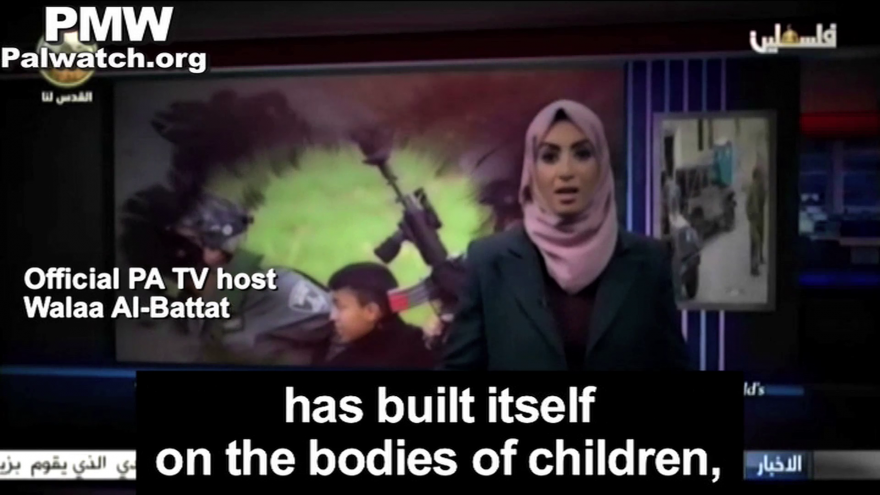Australia/Israel Review
Scribblings: More dancing and singing for terror
Jul 2, 2020 | Tzvi Fleischer

Last month in this column, I discussed a dance video repeatedly broadcast on official Palestinian Authority (PA) TV which openly promoted suicide bombings with lines like “Strap on the explosive belt, detonate the first in Haifa, the second in Atlit [Israeli cities]”
Just to demonstrate this is not a one-off, I wanted to mention a few other music videos recently broadcast on official Palestinian TV (all examples documented and translated by Palestinian Media Watch).
May 25, 2020 – Popular PA TV children’s host Walaa Al-Battat sings a song about how Israel is an ”occupation,” existing on “stolen land,” because “Palestine is Arabian.” However, Palestinians will “get all of it back” and Israel “will disappear.” The video includes footage of Palestinian rioters throwing rocks and burning tyres and other violence.
May 30, 2020 – A music video contains lyrics about how Palestinians are a “great people, it fights with daggers and rocks, with knives and cannon shells, with a poem and a song” against “Allah’s enemy”.
June 1, 2020 – A song in a PA TV video includes lyrics “Allah is with us. He is stronger and greater than the Children of Zion…My red blood waters the greenery with lemon flavour…We are the victors… My chest is a machine gun’s magazine…”
June 1, 2020 – A music video with lyrics including “We are at your service, O Al-Aqsa, our blood is your torch… Defend the honour and the religion, With the help of men who are not traitors – they do not fear death…” When the lines about “men who are not traitors” are sung, the video featured footage of two actual stabbing attacks by Palestinians against Israelis.
June 1, 6, 9, 2020 – A patriotic song with lyrics such as “I’ve remained loyal to my religion. On my land you will find me. I will sacrifice myself for my family. My blood is Palestinian, Palestinian” is accompanied by images of famous Palestinian terrorists, such as Dalal Mughrabi, who led a 1978 attack on an Israeli bus in which 37 civilians were murdered, including 12 children, and Salah Khalaf, who planned the massacre of Israeli athletes at the Munich Olympics in 1972.
June 8, 15, 16, 17, 2020 – A music video is broadcast with lyrics such as “Jihad is necessary and self-sacrifice is necessary… Draw your sword from its sheath, and let it not return to the sheath afterwards… Kiss a Martyr on the land, who called on its behalf to Allah and fell as a Martyr.”
There is more, but hopefully that’s enough to demonstrate that musical incitement to terror and violence is a major element of the programming of the official TV station of the supposedly moderate Palestinian Authority.
Court Out
On June 9, there was a ruling by the Israeli Supreme Court which didn’t receive much coverage outside of Israel, but should have. By a ruling of 8-1, the Court declared that the controversial Regularisation Law, passed by the Knesset in February 2017, was unconstitutional and would be annulled.
This was a law that occasioned much criticism of Israel when it was passed, because it allowed buildings in West Bank settlements which had been built on privately-owned Palestinian land in the good faith belief that the land in question was state land to remain in exchange for compensation to the land’s owner.
As most Israel experts predicted at the time, the powerful Israeli Supreme Court said Israel can’t have such a law, because it “knowingly and unequally infringes upon the property rights of Palestinian residents of the area.”
This Supreme Court finding deserves attention for two reasons:
• It is often the case that controversial and even ill-advised proposals, laws or ideas are thrown up and debated in Israel’s raucous democracy, and then professional Israeli critics and international media seize on them. The activists present them as proof that Israeli democracy is a sham and Israel is racist by nature, with the media happy to report sympathetically on such critical claims. But when Israeli democracy rejects or reverses an ill-advised idea or legal change, as it has in the current case, this is rarely even reported. Media consumers who heard the initial highly critical coverage of controversial Israeli moves may never find out that they were never implemented or were rapidly reversed.
• The Court finding also illustrates a basic fact about Israeli settlement construction that many outside observers do not understand: Israeli settlements have never been allowed to be built on privately-owned Palestinian land. I have seen claims that Israel is bulldozing Palestinian neighbourhoods to build settlements and replacing the local population with Jews. This is simply fiction.
The Regularisation Law was passed to deal with a relatively small number of cases where the Israeli courts have found that valid Palestinian land ownership claims were inadvertently violated. Many cases involve illegal outposts created without Israeli Government approval and later legalised.
When the Regularisation Law was passed in 2017, it was widely claimed by critics both inside and outside of Israel that it would pave the way for the wholesale seizure of private Palestinian land for settlement expansion in the future – even though the language of the law itself permits no such thing.
The Supreme Court ruling calls attention to the reality – settlement buildings are not allowed to be built on privately-owned Palestinian land, and the Israeli judiciary will likely guarantee this will always be the case.
Tags: Islamic Extremism, Israel, Palestinians, Terrorism






